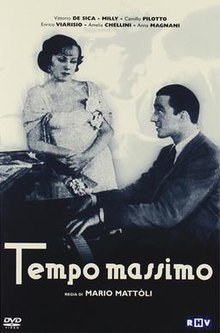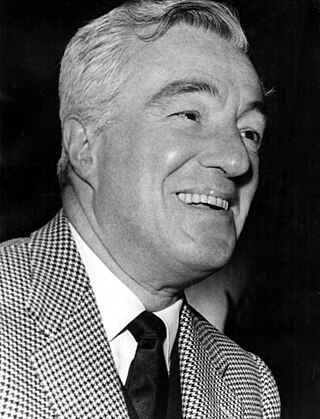
Vittorio De Sica was an Italian film director and actor, a leading figure in the neorealist movement.

Maddalena, Zero for Conduct is a 1940 Italian "white-telephones" comedy film directed by Vittorio De Sica. It is a remake of the Hungarian film Magda Expelled (1938).
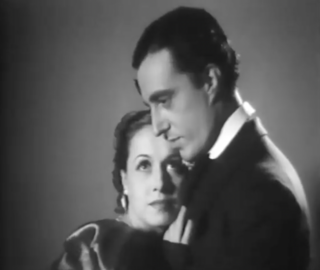
I Love You Only is a 1935 Italian historical drama film directed by Mario Mattoli and starring Milly, Vittorio De Sica and Giuditta Rissone.

Cavalcade of Heroes is a 1950 Italian historical melodrama film directed by Mario Costa and starring Cesare Danova, Carla Del Poggio and Vittorio Sanipoli. It depicts the events around the founding of the short-lived Roman Republic of 1849.

Camillo Pilotto was an Italian film actor. He appeared in 101 films between 1916 and 1963. He was born and died in Rome, Italy.
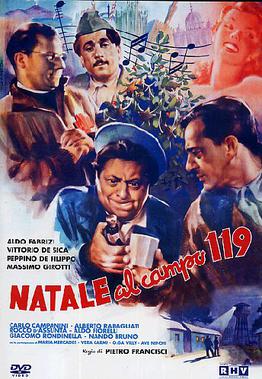
Christmas at Camp 119 is a 1947 Italian comedy-drama film directed by Pietro Francisci and starring Aldo Fabrizi, Vittorio De Sica and Peppino De Filippo. A group of Italian prisoners of war being held captive in California dream of life back home as they await their release.

Two Happy Hearts is a 1932 Italian "white-telephones" comedy film directed by Baldassarre Negroni and starring Vittorio De Sica. It is known for its modernist set designs.

The Old Lady is a 1932 Italian comedy drama film directed by Amleto Palermi and starring Emma Gramatica, Maurizio D'Ancora and Armando Falconi. It also features Vittorio De Sica in his first sound film. The film's sets were designed by the art director Redo Romagnoli.
Everybody's Secretary is a 1933 Italian comedy film directed by Amleto Palermi and starring Armando Falconi, Giuditta Rissone and Vittorio De Sica. The film's sets were designed by the art director Giulio Frati. It features four sketches from the Za-Bum show and was shot entirely on location at the Teatro Argentina in Rome.

Anchise Brizzi was an Italian cinematographer.

Castles in the Air is a 1939 Italian "white-telephones" comedy film directed by Augusto Genina and starring Lilian Harvey, Vittorio De Sica and Otto Treßler. It was made at Cinecittà in Rome, as part of a co-production with Germany. A separate German-language version was also released. It is based on a novel by Franz Karl Franchy.

Cardinal Messias is a 1939 Italian historical drama film directed by Goffredo Alessandrini and starring Camillo Pilotto, Enrico Glori and Mario Ferrari. The film was awarded the Mussolini Cup at the 1939 Venice film festival. It portrays the life of Guglielmo Massaia, a nineteenth-century Italian known for his missionary work in the Ethiopian Empire.

Pact with the Devil is a 1950 Italian melodrama film directed by Luigi Chiarini and starring Isa Miranda, Jacques François and Eduardo Ciannelli. Much of the film was shot on location in Calabria in Southern Italy.

The Haller Case is a 1933 Italian thriller film directed by Alessandro Blasetti and starring Marta Abba, Memo Benassi and Camillo Pilotto. The film is based on the 1893 play Der Andere by Paul Lindau. It marked the screen debut of Isa Miranda, who had her breakthrough role the following year in Everybody's Woman and emerged as the most international-renowned Italian actress of the decade.

The Adventuress from the Floor Above is a 1941 Italian "white-telephones" comedy film directed by Raffaello Matarazzo and starring Vittorio De Sica, Clara Calamai and Giuditta Rissone. It was made at the Palatino Studios in Rome. The film was part of the popular White Telephone genre of comedies.
Pietro Micca is a 1938 Italian historical war film directed by Aldo Vergano and starring Guido Celano, Renato Cialente and Camillo Pilotto. It was shot at the Fert Studios in Turin. The film marked the screen debut of Clara Calamai, who went on to be a leading Italian star of the next decade.
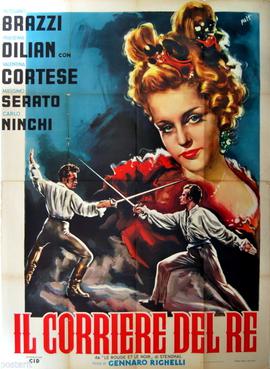
The Courier of the King is a 1947 Italian historical film directed by Gennaro Righelli and starring Rossano Brazzi, Irasema Dilián and Valentina Cortese. It is an adaptation of the 1830 novel The Red and the Black by Stendhal. It was the final film of the veteran director Righelli, who had previously directed a silent version of the story in 1928. The film's sets were designed by the art director Ottavio Scotti.
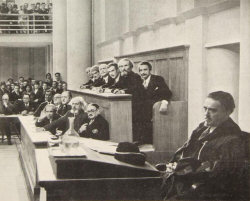
Before the Jury is a 1931 Italian crime film directed by Guido Brignone and starring Marcella Albani, Lia Franca and Carlo Ninchi. It was made at the Cines Studios in Rome. The film is a precursor to the later genre of Giallo films.

The Sinner is a 1940 Italian drama film directed by Amleto Palermi and starring Paola Barbara, Vittorio De Sica, and Fosco Giachetti.
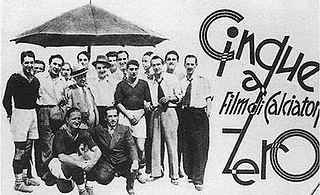
Five to Nil is a 1932 Italian sports comedy film directed by Mario Bonnard and starring Angelo Musco, Milly, and Osvaldo Valenti. It was inspired by a 5–0 victory by A.S. Roma against their rivals Juventus in 1931. It was shot at the studios of Caesar Film and included scenes featuring the real-life Roma players.
